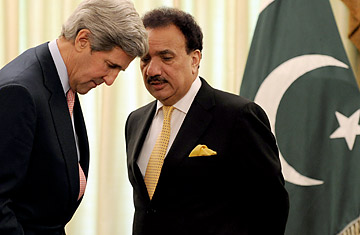
US Senator John Kerry, left, listens to Pakistani Interior Minister Rehman Malik prior to a meeting with Pakistani Prime Minister Yousuf Raza Gilani in Islamabad on May 16, 2011.
Whatever good this week's visit by Senator John Kerry had done to soothe U.S.-Pakistan tensions was complicated by Tuesday's firefight between Pakistani troops and a NATO helicopter that had crossed into the country from Afghanistan.
During his meeting with Pakistan's top civilian leaders, Senate Foreign Relations Committee chairman and White House confidante Kerry was critical about the anti-American environment cultivated in Pakistan in the wake of the operation to kill Osama Bin Laden. After a couple days of embarrassing reflection, most of Pakistan's politicians, journalists and commentators have closed ranks behind the military's anger at the U.S. for violating Pakistani sovereignty. Kerry pushed back, admonishing leading politicians including Prime Minister Yousaf Raza Gilani.
"You can't keep telling us you want good relations but your people don't like us," Kerry had said, according to a senior Pakistani official present. "You must explain the benefits of the relationship to the people." The Massachusetts Democrat had a similar experience earlier this year, when he visited the country to meet with top leaders in an effort to secure the release of CIA contractor Raymond Davis. In both cases, U.S. officials believe that Pakistan's leadership, particularly the security establishment, has discreetly stoked anti-American sentiment to create leverage in talks with the U.S.
Kerry this week also warned Pakistani leaders of the danger of their U.S. aid being cut off. The Senator, who co-authored a major aid package that triples non-military assistance to Pakistan, has been fighting off efforts by many in Congress to withdraw that aid in the wake of the bin Laden debacle. Kerry made clear that Pakistan would have to take a series of steps to ensure that the aid does not stop flowing. But Pakistan's leaders have been surprisingly sanguine about the threat to withhold aid. The opposition has urged that Pakistan reject foreign aid, in an attempt to cast itself as more nationalistic than he government.
One senior Pakistani official conceded that it could now be "difficult" for Secretary of State Hillary Clinton to certify that Pakistan has met the conditions laid out in the Kerry-Lugar-Berman aid bill. But the attitude of the generals is influenced by feedback from within the ranks. In the days following the bin Laden operation, Army Chief General Ashfaq Parvez Kayani has been touring bases, and has found a high degree of discontent. Junior officers are upset at the Inter-Services Intelligence directorate (ISI) for its failures to find bin Laden earlier, but they are chiefly angered by the U.S. decision to mount a unilateral raid on their territory, military and government officials say. Weekly "pulse reports" from various garrisons have registered a similar mood across the country, officials say. The generals' public response appears to have been partly an effort to placate anger within the military.
Kerry's visit culminated in a rare "joint statement", which while short on specifics, committed the two countries to take several unspecified "immediate steps" to revive their working relationship. Pakistan promised to return the tail of the stealth helicopter that crashed during the raid and was later blown up by the Navy SEALs. Earlier, there had been speculation that Pakistan would send the remains of the helicopter to China, a closer but less engaged ally, for "reverse engineering". The statement added that future operations involving the pursuit of "high-value" targets would be conducted jointly. And, not unimportantly, Kerry sought to allay a widely held suspicion among Pakistanis by assuring that the U.S. had no intent to snatch their much-prized nuclear arsenal.
Pakistani officials were not willing to discuss the details of any agreements with Kerry, but said that the joint statement helped them move forward. It helps Pakistan "save face" at home by addressing concerns over sovereignty, they said, while allowing the U.S. to continue operating against al-Qaeda and other high-profile targets it wishes to pursue. Last week, Pakistan's parliament had threatened to try and stop the CIA drone program, although drone attacks have continued almost daily since then.
The reassurances on sovereignty may help Kayani cool tempers in the military and make it easier to continue working with the U.S. In his private conversations, the Army chief has been arguing that while he is not happy with the current state of the relations with Washington, Pakistan has no alternative but to maintain it. Pakistan can ill-afford becoming further isolated and starved of vital funding, or risk losing opportunities to shape the endgame in Afghanistan. The generals realize that they need to demonstrate a greater willingness to pursue al-Qaeda on their soil, but are aggressively determined to protect what they see as their own interests.
The problem, of course, is that Pakistan's interests, as defined by the generals, and those of the U.S. are often at odds, as Tuesday's events demonstrated. First, Pakistan announced with great fanfare that it had captured an important al-Qaeda member in the bustling port city of Karachi. It later emerged that the man named as Muhammad Ali Qasim Yaqub, alias Abu Sohaib al Makki, and described as of Yemeni descent, is an obscure figure unknown to Western officials. The Pakistanis now claim that he is a "mid-level" operative and explosives expert. On the same day, the NATO helicopter crossing undermined reassurances to the Pakistani generals about respect for their country's sovereignty. As ever in this complicated, fractious relationship, tentative progress can quickly be eclipsed by a fresh confrontation.
